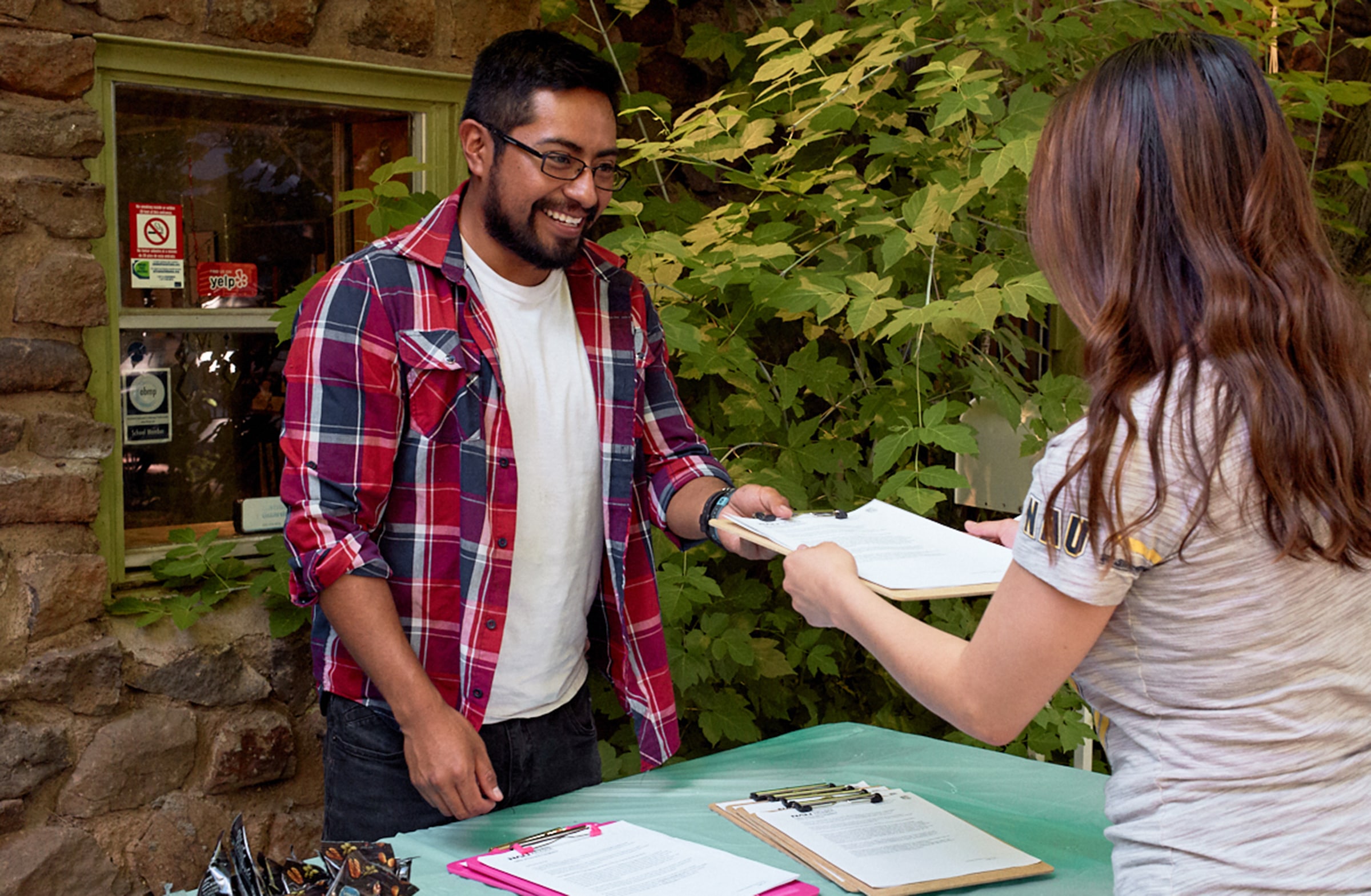Report highlights COVID-19 experiences of community health workers

Community health workers (CHWs) — also referred to as community health representatives and promotoras de salud — are frontline public health workers who are trusted and welcomed into the homes of their communities.
A team from Northern Arizona University’s Center for Health Equity Research (CHER) and the Arizona Community Health Workers Association (AzCHOW) developed a report that explores the experiences of CHWs and the communities they serve during the COVID-19 pandemic, and offers recommendations for developing effective COVID-19 health education materials, including on the vaccine.
“Community health workers have the most contact with the people they serve and have the best expertise on the thoughts, fears and hopes of their community,” said Samantha Sabo, associate professor of the CHER and NAU’s Department of Health Sciences. “Their expertise is invaluable, and they are able to disseminate COVID-19 materials in their communities better than anyone.”
To create the report, the researchers conducted a series of focus groups with Latinx CHWs in Arizona between January and February of 2021. Researchers were Omar Gomez, Dulce Jiménez, and Esther Cadman, research coordinators with CHER; Julia Gardner, assistant clinical professor, NAU’s Department of Health Sciences; Amanda Pollitt, assistant professor, CHER and NAU’s Department of Health Sciences; Ruby Meraz, AzCHOW training center director; and Sabo.
The report and the collaboration between CHER and AzCHOW are part of the National Institutes of Health’s Community Engagement Alliance Against COVID-19 Disparities (CEAL) — a multistate alliance for outreach and engagement in ethnic and racial minoritized communities to address health disparities during COVID-19.
Sabo is one of the multiple principal investigators of Arizona CEAL along with researchers from University of Arizona, Arizona State University, Mayo Clinic and AzCHOW.
Through Arizona CEAL, CHER and AzCHOW have worked together for the past year to develop and disseminate accurate, up-to-date COVID-19 information for CHWs to share with their communities.
Survey results
The CHWs reported that vaccine safety and side effects were two of the most prominent concerns among their clients. They also found that the logistics of accessing vaccines pose several barriers for people who are Latinx.
The barriers include:
- Technology — lack of internet or devices to access vaccine appointment websites; limited ability to navigate technology due to websites that are difficult to use
- Location and transportation — long distance to vaccination sites, limited personal and public transportation options for traveling to sites
- Immigration — concerns related to lack of US identification and having to show proof of residency, citizenship, or lawful presence when getting vaccinated
- Comprehension and language — materials and websites with COVID-19 vaccine information are not available in Spanish and/or are inaccessible to the community due to complex medical/scientific terminology used
CHWs expressed a strong desire to help their clients through the various challenges experienced during the pandemic, but were faced with limited resources, tools, or knowledge in their communities. They felt overwhelmed by the sudden changes that came about in their lives and CHW work as a result of the pandemic, and found creative ways to adapt to the situation in order to develop and maintain relationships with their clients.
The ways CHWs adapted to engage with and advocate for their clients include social media, phone or video appointments instead of in-person visits, and outdoor physically distanced gathering.
Recommendations
In the report, the researchers recommend developing user-friendly materials and websites, with translation into Spanish, that are written at a sixth grade level where CHWs could direct their clients for accurate COVID-19 information.
This information should come from reputable sources, such as local and state health departments and the CDC and should be presented in clear and plain language with use of culturally relevant imagery, videos, and other media to increase engagement and comprehension.
Recommendations to improve trust, reduce fear-related hesitancy, and increase COVID-19 vaccine acceptance and uptake from the focus groups include:
- Incorporating trustworthy figures to share COVID-19 information, such as healthcare providers, religious leaders, and scientific and medical experts
- Using testimonials of individuals who have already received the vaccine to share their experiences
- Explaining vaccine differences, including ingredients, how they work in the body, effectiveness, safety, and side effects
- Communicating the purpose of vaccination in terms of health maintenance for the family and the community
- Stressing the commitment to wellbeing for all people
- Disseminating information through various means, such as social media, local radio and news networks, local businesses
Jiménez and Gomez discussed the report results with about 20 people at the AzCHOW 18th Annual Conference on June 25.
“Clients are hesitant when they do not understand scientific terms and are afraid of ingredients causing harm,” one CHW said during the conference.
During their presentation at the conference, Jiménez told the attendees that the opportunity to discuss the experiences of CHWs in focus groups was critical to creating successful COVID-19 community outreach material.
“We hope to build long-lasting partnerships,” Jiménez told the CHWs during the conference. “In partnership with AzCHOW, our goal with these focus groups is to hear what is happening on the ground so we can assist CHWs in helping their clients to receive accurate and timely COVID-19 information, including information needed to make decisions around vaccination.”
According to the report results, one of the key reasons that CHWs are highly effective in bringing accurate information into their communities is because they are happy serving their community and take pride meeting people where they are.
“They are successful because they find ways to stay connected with people and keep them engaged,” Gomez said of CHWs. “They are invested in their community and, in turn, their community knows they have their best interests at heart.”